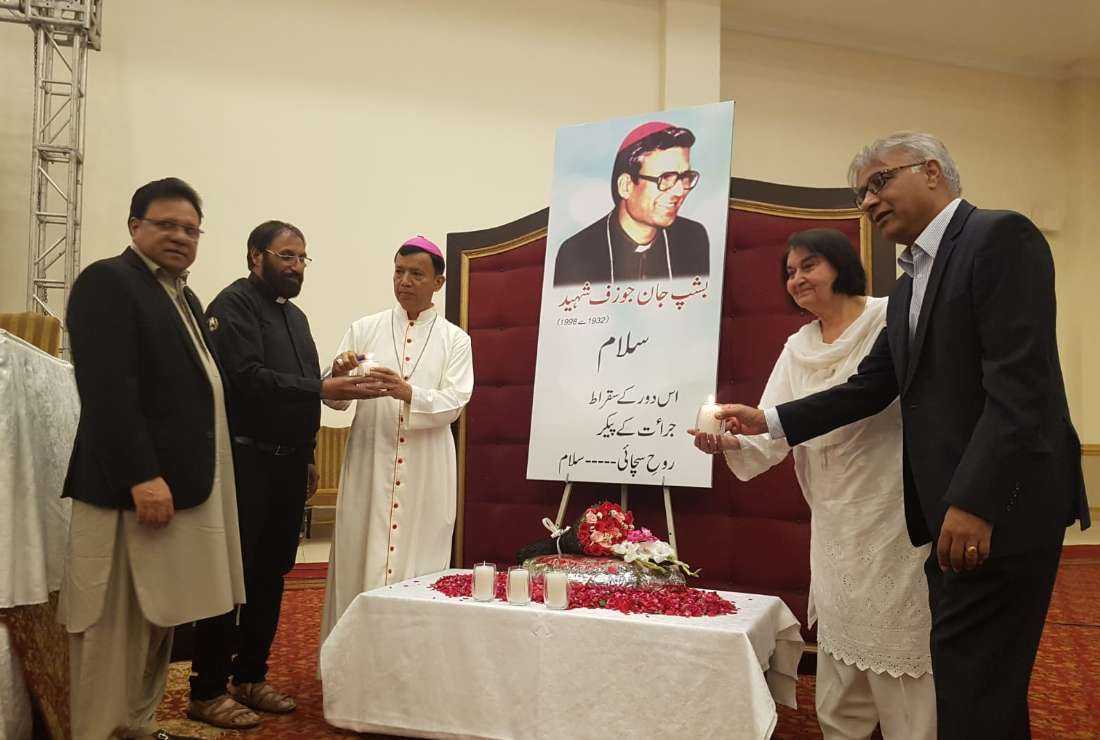
First ethnic Punjabi prelate, Bishop John Joseph of Faisalabad, shot himself 25 years ago in blasphemy law protest

Archbishop Sebastian Shaw of Lahore and others at a memorial seminar to honor Bishop John Joseph who killed himself in protest against Pakistan's controversial blasphemy law, in Lahore on May 3. (Photo: Kamran Chaudhry)
Human rights activists in Pakistan joined Church leaders on May 3 in paying tribute to Bishop John Joseph of Faisalabad ahead of the 25th anniversary of his committing suicide by shooting himself to death in protest against the country's controversial blasphemy law.
“We never glorify his final step. He ranks similarly to the Church’s recognized martyrs and saints. We are committed to carrying forward his legacy for the respect of human dignity, basic rights and religious diversity. His movement against the discriminatory law continues,” Archbishop Sebastian Shaw of Lahore told UCA News on the sidelines of a memorial seminar on May 3.
The first priest from Pakistan’s Punjab province and first ethnic Punjabi prelate, Joseph took his own life on May 6, 1998, to protest against the sweeping blasphemy law which confers a death sentence on anyone accused of insulting the Prophet Muhammad.
He shot himself in front of the Sahiwal sessions court in Faisalabad, one of Pakistan's wealthiest cities, after a Christian, Ayub Masih, was sentenced to death for allegedly insulting the founder of Islam.
In 2002, the Supreme Court overturned Masih’s conviction and released him.
To hail Joseph’s act, activists also conducted a vigil in front of the Sahiwal court.
“Many local Christians still don’t agree with the suicide"
In Lahore, one of the oldest dioceses in Pakistan, a lay forum for contextual theologies, Maktaba-e-Anaveem Pakistan (MAP), launched “Struggle for Justice,” a compilation of news and essays on Joseph in association with the Center for Social Justice which was attended by 100 people, including lawyers, activists, priests and nuns.
According to the MAP's founder-director, Father Emmanuel Asi, the tragedy deserves contextual interpretation, inspired by the Second Vatican Council rather than based on the doctrines of Canon Law.
“Many local Christians still don’t agree with the suicide,” the priest said.
“The bishop’s final act should not be isolated from his whole struggle for human rights and social justice. We view him as a martyr, a shepherd who gave himself to his people. The historical event is observed every year to explore its mystery and meaning. It should become a movement.”
Father Khalid Rashid Asi, director of the Diocesan Commission for Harmony and Interfaith Dialogue in the Faisalabad diocese, which encompasses Sahiwal, plans to launch another book on the late bishop in a seminar scheduled this weekend at the Bishop’s House.
“It is due to public martyrdom that we are able to convince Muslims about the misuse of the blasphemy laws. Even Jesus broke his body for his disciples at the Last Supper,” he said.
Peter Jacob, director of the Centre for Social Justice, who organized the memorial program said the bishop “tried everything humanly possible before sacrificing himself.”
"We cannot disregard his services because of his final act. The popes never condemned it because they understand the context. Pope John Paul II rather sent a solidarity message to the people of Pakistan which was read out at the bishop's funeral.”
“The government should create an atmosphere conducive to discuss the repealing blasphemy laws or at least amend these laws in compliance with the requirements of the International Covenant on Civil and Political Rights,” Jacob said."Mere accusations can often lead to mob violence and gruesome murders"
Blasphemy is legally punishable by death in Pakistan. Though no one has been executed so far by the state, mere accusations can often lead to mob violence and gruesome murders.
Nearly 52 percent of those accused belonged to minorities despite their small ratio (3.52 percent) in the population, according to the Center for Social Justice (CSJ).
In its annual fact-sheet, the NGO noted that 171 blasphemy cases were reported in 2022, 84 in 2021, 208 in 2020, 36 in 2019 and 61 in 2018.
At least 2,120 people were accused of committing blasphemy between 1987 and 2022 and Punjab province tops the list with more than 75 percent.
Help us keep UCA News independent
The Church in Asia needs objective and independent journalism to speak the truth about the Church and the state.
With a network of professionally qualified journalists and editors across Asia, UCA News is just about meeting that need. But professionalism does not come cheap. We depend on you, our readers, to help maintain our independence and seek that truth.
A small donation of US$2 a month would make a big difference in our quest to achieve our goal.

Share your comments